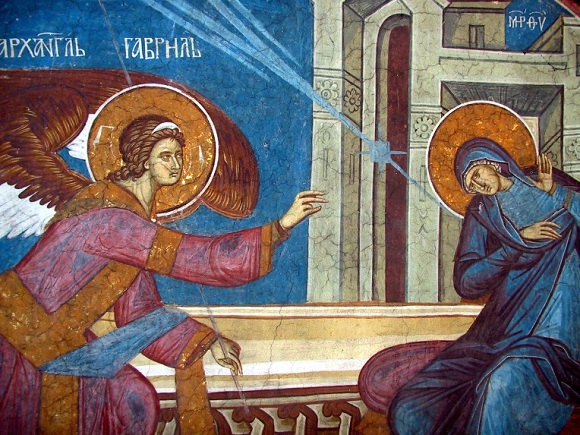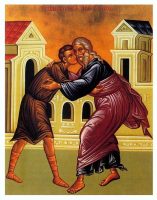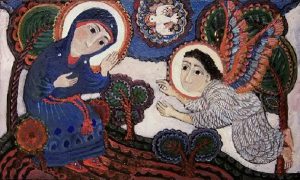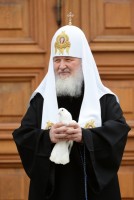The preacher, Archpriest Gregory Hallam, starts the sermon by reciting a number of translations of the word “yes” in different contemporary languages.
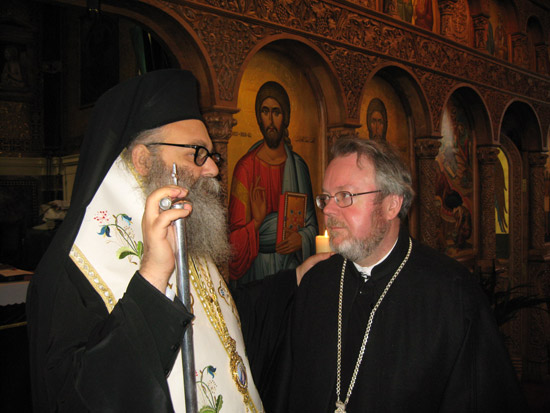
Patriarch John X of Antioch with Fr. Gregory
This is just a small selection of the word “yes” as uttered in twenty-four languages. There is but one “yes,” however, that has saved them all — the “yes” that turned the divisive babble of Babel into the diverse harmony of Pentecost. This “yes” was freely offered to God today, trembling but with a pure heart and firm intention, by our Lady the Theotokos and Ever-Virgin Mary. By her simple yet earth shattering “Let it be,” the Word received our humanity, body and soul, and came to dwell among us, full of grace and truth (John 1:14).
In the icon of the Annunciation, the Archangel Gabriel advances towards the Virgin dynamically, demonstrating that the Word of God, the Logos, is alive and active. The Mother of God responds with humility and grace, determined not to repeat the mistake of the first Eve. She desires only to be a servant, a handmaid of the Lord, and thereby to conceive Him in her womb Who is Jesus, the Saviour of the world. In this way her “yes” enables her to become the New Eve, reversing Adam’s curse and, by the Incarnation, enabling the damage of the Fall to be undone. Her “yes” ushers in a New Creation that will finally be forged by the death and resurrection of her Son. Here is what St. Irenaeus of Lyons wrote in the second century concerning this “yes”:
“The Lord, coming into His own creation in visible form, was sustained by His own creation which He himself sustains in being. His obedience on the tree of the cross reversed the disobedience at the tree in Eden; the good news of the truth announced by an angel to Mary, a virgin subject to a husband, undid the evil lie that seduced Eve, a virgin espoused to a husband” (Against the Heresies).
Truly, the Annunciation is the beginning of our salvation. In so far as the Annunciation required the active and willing cooperation of the Virgin, her “yes,” this reminds us that sometimes (perhaps usually, who knows?), God waits upon our response before He acts. Our word then counts just as much as His. When the Mother of God says “yes,” the doors of the Temple are flung wide open and humanity re-enters Eden, but this time to be deified and the whole of the Cosmos with it. This is why the icon of the Annunciation adorns the Holy Doors to the altar. The coming of Christ through her “yes” has opened up the Kingdom for all and brought the life of resurrection to a dying world. We may suffer in witness to this Good News on account of sin, but these are but the birth pangs of the New Creation, forged in water, blood, and fire. As St. Paul wrote in his letter to the Romans: We know that the whole Creation has been groaning in travail until now, and not only the creation, but we ourselves, who have the first fruits of the Spirit, groan inwardly as we await for adoption as sons, the redemption of our bodies. For in this hope we were saved (Romans 8:22-24). And just before he wrote and prophesied: The creation itself will be set free from its bondage to decay and obtain the glorious liberty of the children of God (Romans 8:21).
This deep connection between the first Creation of the Cosmos and the New Creation of the Kingdom of God has been noted many times over the centuries. In the modern era we received a startling, fresh, and new expression of this ancient truth by Metropolitan Philaret of Moscow. In a sermon on the Annunciation in 1874 he wrote:
“In the days when the world was being created, when God pronounced the life-giving and powerful words, ‘Let it be,’ the Word of the Creator made creatures appear out of nothing. But on this unique day, when the divine Miriam pronounced her brief and obedient ‘Let it be so,’ I hardly dare to say what happened then – the word of the creature caused the Creator to come into the world.”
As we have already seen, if the Annunciation counts for anything, it teaches us that “our word counts just as much as His” – at least to get the whole salvation process rolling, cascading down grace from her who is full of grace to each one of us. We, too, can thereby become grace-bearing temples of Christ by the Holy Spirit as we receive our adoption as sons and daughters of God, but ONLY if we join her in saying “yes” to God. In relation to sin, of course, we must be a “no” people, but in relation to God we must always be a “yes” people. It is a straight choice then, but often a long and difficult battle. Appropriately, the feast of the Annunciation often falls in the middle of Great Lent, as we seek to fight sin through prayer and fasting.
Let us reflect a little now on these binary choices, these “yes” and “no” decisions and actions that confront us today as Orthodox Christians living in (arguably) the post-Christian west. How shall we respond as we face up to these issues, these challenges? If we do not respond well, in imitation of the Theotokos, then Christ will not be born within us. If we do say “yes” to God then, most certainly, He will be born anew in us. Everything will then change for the better, through us and by Him.
So, will you participate now in my litany of no’s and yes’s? Will you consider your own choices with an intention to seek and do God’s will? My own choices I now lay before you as my response to the angel’s call. Please listen to your own annunciation — the announcement within you of what God hopes to achieve in and through your life on earth. Even as we tremble before God, let us also trust Him, so that we may join our “yes” to that response of the Theotokos and Ever-Virgin Mary.
As for me, I will say “yes” to life and “no” to death; “yes” to God and not to “Satan”; “yes” to love and “no” to hate; “yes” to my neighbour and “no” to myself; “yes” to the Gospel and “no” to all that is opposed to it; “yes” to mission and “no” to everything that is inward-looking; “yes” to the love of country, language, and culture but “no” to divisive nationalism; “yes” to a living hope and “no” to a paralysing despair; “yes” to action and “no” to prevarication and sloth; “yes” to Christ that God may be all and in all, and “no” to anything less worthy. Whatever our own Annunciation may be, whatever events God may bring into our lives that demand a “yes” or a “no” response, let us always remember this: Behold I am the servant (or handmaid) of the Lord. Let it be to me according to your word. And the angel departed from her (Luke 1:38).
Even in popular culture, by courtesy of a certain Sir Paul McCartney:
“When I find myself in times of trouble
Mother Mary comes to me
Speaking words of wisdom, let it be.
And in my hour of darkness
She is standing right in front of me
Speaking words of wisdom, let it be.
Let it be, let it be.
Whisper words of wisdom, let it be.”
Amen, so be it.
Source












